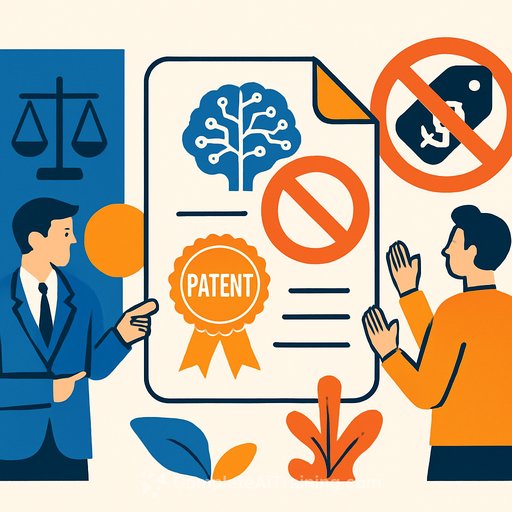ACPAA Bans AI-Generated Patent Filings and Cracks Down on Price Wars
On September 22, 2025, the All-China Patent Attorneys Association (ACPAA) issued a revised Code of Professional Ethics and Practice Discipline for Patent Agents. The update aims to raise service quality, tighten professional conduct, and support higher standards across China's patent agency sector.
Two headline changes stand out: a bar on using artificial intelligence to directly generate patent application documents for final submission, and a prohibition on maliciously lowering prices for patent services. Earlier in 2025, Nanjing also banned AI use in drafting patent application documents for pre-examination, signaling broader scrutiny of AI in patent drafting.
Who ACPAA Is-and What It Can Enforce
ACPAA is a voluntary, profession-wide body approved by the Ministry of Civil Affairs and China's National Intellectual Property Administration (CNIPA). Its enforcement power is limited to expelling members, but its Code often functions as the profession's baseline for conduct.
The association's stated goals include reinforcing self-discipline, strengthening professional rules, improving service quality, and promoting high-quality development of the patent representation profession. For firms that rely on Chinese agents, the Code is a practical compliance reference point.
Key Provisions to Watch
Article 15 (Quality and AI Use): Patent agents are responsible for the quality of the work they sign. They are prohibited from using AI to directly generate patent application documents for final submission.
Article 48 (Unfair Competition): Patent agencies are barred from unfair competition, including:
- Making false claims about capabilities, hyping cases, or comparative publicity against other agencies.
- Maliciously lowering service prices.
- Expressing or implying special relationships with courts, administrative bodies, social groups, or their staff.
- Proactively contacting another agency's clients about specific cases, or accepting work obtained that way.
- Soliciting business by criticizing other agencies.
- Making improper promises about application outcomes or case results.
- Offering or promising illegal commissions, kickbacks, referral fees, or other benefits.
- Infringing other agencies' trade secrets.
- Other conduct that undermines fair competition.
Implications for Legal Teams and Foreign Filers
- Expect human-led drafting for China filings. Confirm in engagement letters that final application documents submitted in China are not directly AI-generated.
- Budgeting: price dumping is targeted, so outlier quotes may disappear. Compare on quality, technical depth, and track record.
- Vendor diligence: verify ACPAA membership status and ask for SOPs showing human review and sign-off before filing.
- Workflow alignment: if you or global counsel use AI for early drafting, ensure Chinese agents independently review, rewrite, or validate before final submission.
- Marketing and intake: check that your China partners avoid comparative ads, poaching, and outcome promises-these now carry clear risk.
Compliance Checklist for Patent Agencies
- Update internal policies to forbid direct AI generation of final filing documents; define acceptable tools and steps for human review.
- Document quality control: signatory agent review, claim charting, novelty mapping, and file-history checks before submission.
- Train practitioners on the Code; log attendance and policy acknowledgments.
- Institute pricing governance to prevent "malicious" price cuts; record rationale for discounts.
- Revise marketing materials to remove comparative claims and implied special relationships.
- Strengthen client intake protocols to avoid soliciting specific cases from another agency's clients.
- Tighten trade secret handling with access controls, NDAs, and need-to-know segregation.
- Ban referral kickbacks and informal commissions; create a written channel for reporting violations.
Open Questions
- What counts as "directly generate"? Does structured drafting assistance or template-based editing trigger the rule if the final document is materially AI-produced?
- Scope: beyond initial applications, does this extend to office action responses, amendments, and divisional filings?
- Enforcement: how will ACPAA investigate and prove violations, and will CNIPA or local authorities echo these standards?
- Local overlay: how does this interact with municipal rules like Nanjing's pre-examination AI drafting restrictions?
Immediate Actions
- Audit your China patent workflows and confirm your agents' compliance with Article 15 and Article 48.
- Amend outside counsel guidelines to prohibit direct AI generation of final submission documents and to require documented human review.
- Reassess vendor selection criteria to prioritize technical quality, compliance posture, and transparent pricing over aggressive discounts.
- Monitor ACPAA and CNIPA communications for clarifications and potential adoption by local IP offices.
For broader policy context and updates on China's IP administration, see CNIPA's official site: english.cnipa.gov.cn.
Your membership also unlocks:






